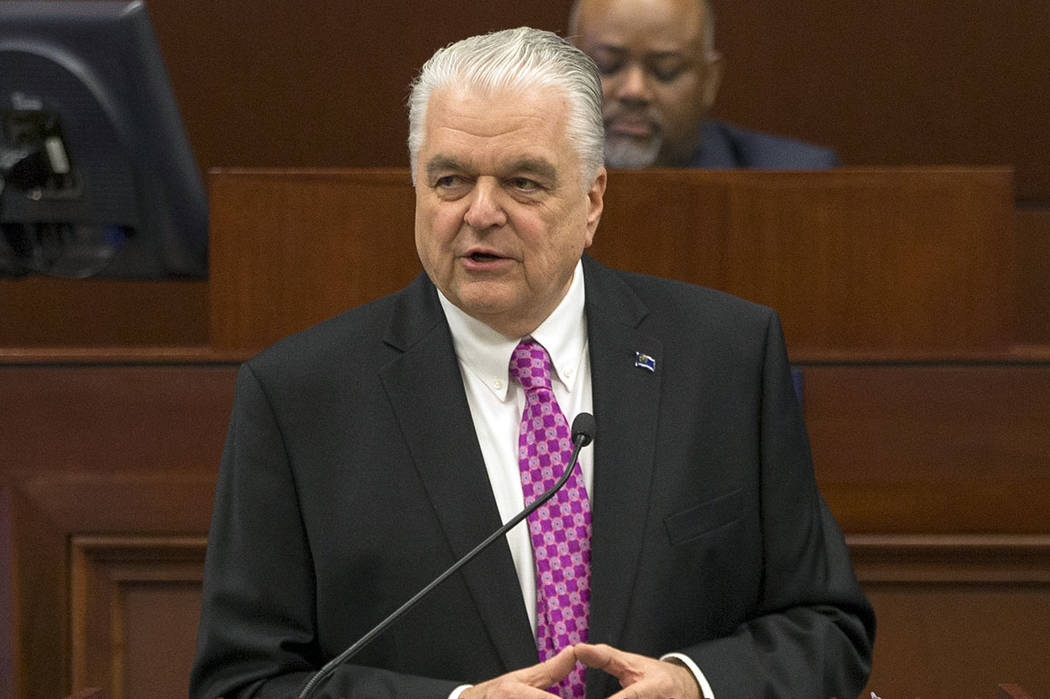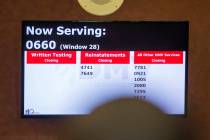EDITORIAL: Sisolak, Democrats wrong to seek shortcut to tax hikes
Forget Washington. If you’re looking for an impending constitutional crisis, head to Carson City.
Nevada’s constitution requires that tax increases pass the Legislature with a two-thirds majority in both houses. That provision — approved by voters in 1994 and 1996 — has frequently frustrated big-government politicians. They’ve either had to do the hard work of securing broad support for new taxes or abandon their plans.
Gov. Steve Sisolak wants a third option — ignoring the constitution. On Thursday, the Review-Journal obtained copy of a nonbinding legal opinion from the Legislative Counsel Bureau saying he could do just that.
Sisolak’s budget relies on receiving around $100 million by extending the current rate of the Modified Business Tax, which is scheduled to decline slightly. Democrats have a two-thirds majority in the Assembly, but are one vote short of two-thirds in the Senate. Sisolak and legislative Democrats sought the LCB’s opinion, because they didn’t want to have to negotiate with Republicans.
While LCB claims to be nonpartisan, it serves as the majority party’s lawyers. If Democratic leaders insist on reaching a certain conclusion, LCB’s lawyers will come up with whatever twisted argument they can to justify it.
Which is exactly what LCB did in this opinion. Nevada’s constitution requires a two-thirds vote “to pass a bill or joint resolution which creates, generates, or increases any public revenue in any form.” Legislators can a pass a tax increase with a simple majority only by sending it out for a vote of the people.
To determine whether a bill “increases any public revenue in any form,” you don’t need a legal opinion, just a calculator. Without the proposed bill, look at what public revenues will be. If the proposed bill passes, see if public revenue will be higher than before. If yes, that’s an increase of public revenue.
Raising revenue is the entire reason Sisolak wants this bill to start with. He needs the nearly $100 million to balance his budget.
It doesn’t matter how a bill increases revenue. It could raise a rate. It could impose a new fee. It could take away an existing tax credit. It could extend an existing tax rate that was scheduled to decline. Turns out, “any” means any.
That’s a problem for LCB’s lawyers, since they had to come up with a rationale for why the constitution doesn’t mean what it says.
“We believe that the two-thirds majority requirement applies to a bill which directly brings into existence, produces or enlarges public revenue in the first instance by imposing new or increased state taxes,” the LCB opinion reads. “However, when a bill does not impose new or increased state taxes, but simply maintains the existing ‘computation bases’ currently in effect for existing state taxes, we do not believe that the two-thirds majority requirement applies to the bill.”
This analysis couldn’t survive the scrutiny of a high school debate team. The maintained rate doesn’t exist without legislative action, because the law requires the rate to decrease. Therefore, a bill maintaining the existing rate is increasing state revenues — as seen by the hole in Sisolak’s budget without this tax extension.
As recently as four years ago, LCB had a different perspective.
In 2011, 2013 and 2015, the Legislature faced a situation similar to the current one. The “sunset taxes” were a group of temporary tax increases that would have gone down if the Legislature did nothing. Then-governor Sandoval wanted to extend those taxes. The Legislative Counsel Bureau determined those bills raised revenue — which is why Sandoval proposed them. Therefore, they needed a two-thirds majority to pass. LCB signified this by writing on the top of each bill, “Requires two-thirds majority vote.”
Those weren’t controversial decisions, because the constitution is so clear.
The only good news is that legislative Republicans are promising to sue if Democrats pass a tax increase without the required two-thirds majority. This issue would eventually end up before the Nevada Supreme Court. In 2003, the court downgraded this section of the constitution in issuing its infamous and since repudiated decision in Guinn v. Legislature. This case would give the court an opportunity for some redemption.
It shouldn’t get that far. Sisolak and legislative leaders should walk back their brazen power grab, before the Supreme Court does it for them.






















